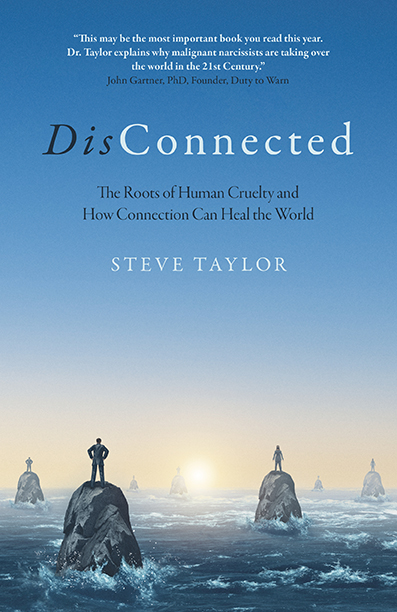The more controversial aspect of Steve Taylor’s book is in the way in which ‘spirituality’ is put forward as the most powerful ‘cure’ for disconnection, and vice-versa, and what provides for connection and empathy.
 Nigel Pocock
Nigel Pocock
“Spirituality” is essentially the means by which a whole egocentric lifestyle can be redirected. As Simone Weil has pointed out, this means to direct one’s thoughts to an authority outside and above oneself, a Person bigger than oneself.
Meditation can aid in removing the ego and supplanting narcissism and its Me First ‘attitude and action’ mutual feedback dynamic (David Myers, “Psychology”), provided it does not feed into this very egocentricity itself. “The flesh (destructive aspects of human nature) wages war against the Spirit (God’s Spirit, the Spirit of healing), and the Spirit against the flesh”, as an early Christian text has it. As Jesus said, “You shall love your neighbour as yourself”, and (even harder) “You shall love your enemy”.
While Taylor emphasises meditation as a de-centring tool using mostly eastern traditions, (because of his panpsychic understanding of reality) it is salutary to remember that meditation is also deeply Jewish, especially in the Psalms.
 As Walter Bruggemann notes, these meditations have much to do with re-orientation of the self, albeit after an uncomfortable time of disorientation. The same might be said of such mystics as Julian of Norwich, and Simone Weil.
As Walter Bruggemann notes, these meditations have much to do with re-orientation of the self, albeit after an uncomfortable time of disorientation. The same might be said of such mystics as Julian of Norwich, and Simone Weil.
This therefore means interiorising a new orientation regarding the self, and learning to decentralise the old, disconnected, unempathetic self. As we grow in self-consciousness, we also grow in accountability and responsibility. Thereby lies the challenge: to remain re-envisioned, and avoid the deadening effects of institutionalisation!
This recognises the truth of Donald MacKay’s “Logical indeterminacy theory (Christianity in a mechanistic universe)”.
This theory states that even if a Universal Mind or Super- computer that knew of every possible cause and effect relationship in the (mechanistic) universe, it could not give a living subject a prediction regarding its next move.
This is because the subject is now free to modify or choose something completely different once it knows of the prediction. In practice, this is very much like everyday accountability: it is when we are given a prediction regarding our behaviour, particularly as regards (say) lack of connection and antisocial (disconnected) behaviour, and its likely consequences.
 This means that responsibility can be taken, and, as Karl Popper pointed out, the prediction can be falsified. In doing so, we learn new useful knowledge about ourselves and society (Popper, “A pocket popper”, ed. David Miller). We move forward, creatively.
This means that responsibility can be taken, and, as Karl Popper pointed out, the prediction can be falsified. In doing so, we learn new useful knowledge about ourselves and society (Popper, “A pocket popper”, ed. David Miller). We move forward, creatively.
Both chance and necessity are a part of human life. There is no such thing as a life dominated by absolute chance or randomness, or unchanging ridigity.
Such a world could not exist, as both chance and necessity are necessary to creativity and newness.
Hence even chance events, such as the random movements of atomic particles (David Bartholomew, “God, chance and purpose”) can be described in terms of patterns, probability and statistics. There is therefore a relative degree of both choice and agency, and regularity (‘laws’, cf., Polkinghorne, “Science and providence”). The one provides stability; the other, opportunity. People have a reflective consciousness, but there is also a biological self, and a physical world of both regularity and contingencies in which this self has to operate.
This choice is a part of a hands-on, community education. We can choose whether to be connected or disconnected. Scott Peck observed that real community moves through stages: Pseudo-community, chaos, listening, community. People have to make a committed choice, in order to learn new patterns of behaviour; to press beyond formal politeness, to flinging their opinions at others (both forms of disconnection and egocentricity), to finding a place where they ‘hear’ the other (a form of connection). In short, learning empathy.
Even here, some kind of altruistic power-over, in the power-to and power-with senses is paradoxically necessary, in the form of a leader who seeks not to dominate, but to empower (power-to) others, and make themselves redundant (Cf. Kathy Ehrensberger, “Paul and the dynamics of power”).
 This is agape, seeking the best for others, and not in the sense used by utopian tyrannies of love for the people, based on a nostalgic fantasy (Staub, “The roots of evil”).
This is agape, seeking the best for others, and not in the sense used by utopian tyrannies of love for the people, based on a nostalgic fantasy (Staub, “The roots of evil”).
Can people rise above narcissistic tyrants to found a better world? Taylor thinks so.
(Photos: Pixabay)












.jpg)












